feature image by Tamea A
Co-created and co-written by a trans woman, directed by a trans woman, starring two trans women and with other trans women on the crew, the upcoming webseries Her Story is poised to be one of the most authentic onscreen depictions of trans women ever. Not only that, but since the cast and crew is filled with so much talent and their vision for the project is so clear and detailed, it’s also poised to be one of the best onscreen depictions of trans women ever.
The upcoming web series focuses on two trans women, Violet and Paige, played by co-creator and co-writer Jen Richards and Angelica Ross, who begin new relationships. Violet starts dating Allie (played by the other co-writer Laura Zak), a cis woman who’s never been with a trans woman before. Paige meets James (played by Christian Ochoa), and enters into a relationship with him without disclosing that she’s trans in their first conversation. While the series looks at the way queer women’s communities can sometimes keep trans women at arm’s length, especially when it comes to dating, and the issue of men dating trans women, overall, it’s really two love stories. With that in mind, I talked to Laura Zak, Jen Richards and Angelica Ross about the series, about dating and about working with so many amazing queer and trans women. Her Story is currently raising funds for post production on IndieGoGo and has until Sunday, September 13 to meet their goal, so if you’d like to vastly improve the way trans and queer women are depicted in media, here’s your chance.
Mey: Hi Laura, can you tell me about your role in the show?
Laura: I play a character named Allie, who’s a journalist. The series starts out with Allie feeling a little frustrated that she’s getting assigned a lot of fluffier pieces and she wants to write pieces that are more substantial, but she doesn’t really have any inspiration for what that more substantial thing is. And then she gets the idea, kind of through some questionable remarks made by one of her friends, to explore the world of transgender women in her community. She hasn’t met any that she knows of, she’s kind of firmly been in exclusively lesbian circles. So she reaches out to a waitress who she knows is trans to do an interview — which is Violet, played by Jen — and then that’s sort of their meet cute and then the interview turns flirtatious, there’s an obvious chemistry. And their arc is pretty much two people getting to know each other who weren’t expecting, for different reasons, to be attracted to each other.
Mey: You talked about the relationship between Violet and your character, Allie, and a lot of the focus of the whole series is on the relationships, why did you want to focus so much on relationships that trans women have, both with cis women and with men?
Laura: There’s something both universal and simple about a love story. And that particular relationship, at least until Sense8, I hadn’t seen the trans woman-cis lesbian relationship played out. We started writing this over a year ago, so this was just kind of before the explosion of trans characters in the media was starting and it just seemed like a very rich and rarely told connection to talk about. Also, in my personal life, I’ve reached a point where I kind of stray away from the idea of labels and too firmly assuming things about myself and who I want to be with romantically because I feel like there have been points in my life where as soon as I label myself one way, life or a person will come along to immediately challenge it. Like, “oh well, maybe i’m not straight,” “maybe i’m not bisexual,” what is it? And I was kind of going through that process and Jen and I were both interested in having the core conflict of these two characters be internal mostly, have there be this chemistry between them so that the audience then is rooting for them to get over their shit so they can be together. Therefore sort of implicating the audience in realizing how much it doesn’t matter, you know, some of the boundaries we set for ourselves.
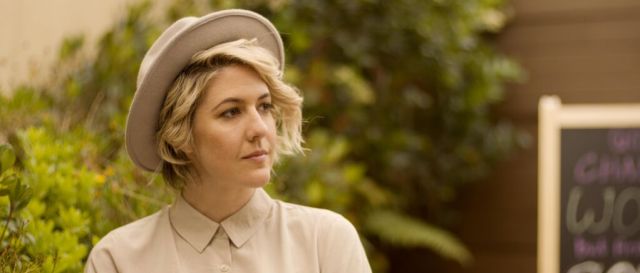
Mey: In the trailer, both your and Jen’s characters talk about how new this type of relationship is for them. Allie even remarks that she doesn’t even think she’s met a trans woman before. What is it about that relationship that drew you to it?
Laura: I think Allie’s character is certainly very open minded and has always deemed herself progressive and liberal and open, and is, through meeting this person and connecting with her, kind of realizing the segregation still within the queer community. We placed Allie within the context of a group of queer women friends who are mostly lesbian identified, all cisgender, and the audience is going to get to experience and learn things through Allie. You know, the audience who isn’t that familiar with the trans community is going to get a lot of knowledge through her in talking to Violet and getting to know Paige. But also on the other side, this window opens up about the bigotry that exists within the queer community, you know, the bias that exists. One of her friends, who is this character named Lisa (played by Caroline Whitney Smith) , is not very accepting of trans women, doesn’t see trans women as a part of her community, and she’s this voice that does exist in the world. And I think it’s surprising to Allie when she starts toying with the idea of what would this mean? Will I still be a lesbian? Can a trans woman be a lesbian? And she has certain strong voices saying “no” and then other voices saying “yes, of course.” So it’s sort of like we’ve personified different voices or tried to, but not in a super political way.
I do think that it’s less of an issue, or one would think it’s less of an issue, for cisgender queer identified women, so it was interesting for us to have Allie’s character be someone who identifies as a gold star lesbian, and for her, that has only ever meant and has only ever been defined by being with other cisgender women. And then that being challenged and her being opened to the fact that it’s being challenged, but still kind of surprised and reflective about “what does this mean” and also being implicated in why haven’t I been friends with trans women before? Why aren’t they enmeshed in her particular community?
Mey: What do you hope people will get out of watching it?
Laura: I’m hoping that it’s a relatable, moving love story that gives a voice to marginalized perspectives that haven’t been heard before. And again, connecting back to the universality of it and humanizing people and seeing trans women as desirable, not in a fetishized way, just as worthy and capable of giving and receiving love in a healthy relationship. That’s not some extreme, and that’s where the simplicity of it comes in. Sydney (Freeland, the director) has said that that’s what attracted her to the story, its simplicity, and that it wasn’t stories of trans people who are just coming out. It’s about trans and queer people who are already existing in their lives as they already are and starting relationships. And it sometimes feels surprising that that seems so novel. It seems almost silly that it hasn’t been more prevalent. I’m excited to kind of be one of the first projects that’s doing that with the women that it’s about behind the scenes and writing it and being part of every part of production.
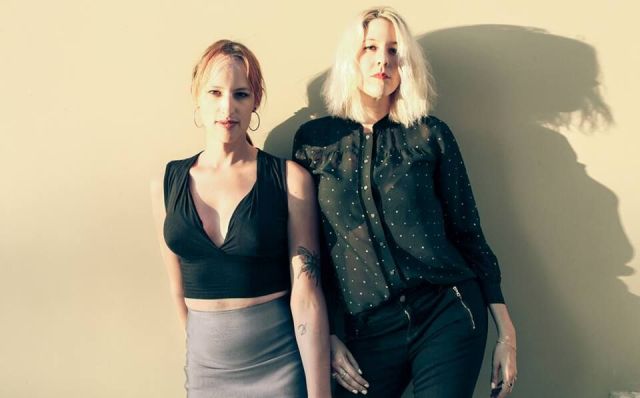
Mey: Speaking of that, what do you think Her Story’s place is in the world of trans media, with Orange is the New Black, Transparent, I Am Cait, I Am Jazz and other projects?
Laura: First of all, i think it’s noteworthy, Her Story being narrative, and also scripted material that’s being written by the communities it’s representing. Ultimately what we’d love for this project to be is to be picked up and be developed into a full show.
I think the lesbian community and gay male community have had their moment where they got their Queer as Folk moment or The L Word moment where there’s a more mainstream show about love lives and dating lives and hopefully this could be something like that.
Next I talked to Jen Richards, and after a few minutes, Angelica Ross joined us.
Mey: Hi Jen. I talked to Laura about this, but the show has two relationships that are the center of the story which is something we don’t normally see in depictions of trans people, or at least in a positive light, when we do see it, it ends in disaster, it’s a joke from the beginning or it is something else completely terrible. Why did you want to focus so much on showing positive trans relationships?
Jen: I would say it’s one part political and one part aesthetic. If I’m being honest, I sometimes skew too far to the political. Luckily I have really great collaborators who skew towards the aesthetic. From the political side, this was an issue I wanted to address. My friends and I are most of us are activists who are engaged in community work in some way shape or form. We’re all feeling really kind of impotent over the danger, violence against trans women of color and those situations. Those of us who are involved with the community often know what is really behind these murders are the relationships between trans women and straight men whose masculinity or sexuality comes into question because of their relationships and respond to that impugning of their masculinity with violence. The most direct way to address that violence is to destigmatize the desire for trans women. A straight man can be in a relationship with a trans women and still be very straight and still be very masculine.
There is this other side to of the few little forays I had into queer women culture, where I was often embraced but a lot of other trans women weren’t. Sometimes I saw skepticism of cis lesbians dating trans women. It struck me as really odd that there were many trans men dating self identified lesbians but I didn’t know any trans women in the queer women circle I was moving through. Politically I wanted to address those two things, aesthetically it was just trying to drive back to the character and the story. Really thinking about who is Violet as a person and what is it like for her to try and relate to Allie. How do Violet and Paige relate to each other? How does Paige relate to James? Always coming back to their personal story.
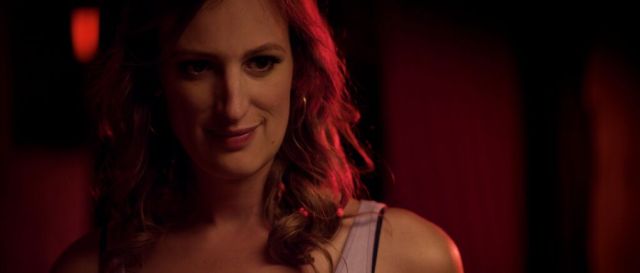
Mey: Going off what you talked about with intimate partner violence against specifically trans women of color who date men or sleep with men, as we’ve seen recently it is a huge problem. The epidemic of murders against trans women is specifically targeted at Black and Latina trans woman who sleep with men and in the show you have Angelica’s character, Paige, who is black trans women who enters a relationship with a man and doesn’t tell him right off the bat that she’s trans.
Jen: Yeah, it is this huge issue. It could have been a purely political thing, like anyone could say there is an epidemic against trans women of color so let’s tell a story of a black trans woman relationship with a man. I think it’s important and I hope more people do tell that story. For me it was a really organic outgrowth of living with Angelica for years and watching her date. We’ve been in a situation where Angelica and I had gone to a fashion show in Chicago and after the show she got picked up by a guy and he had a friend. The four of us went out for drinks and I was uncomfortable because I don’t pass 100% of the time but Angelica does. I was really nervous because Angelica is very comfortable and casual and she transitioned when she was 19, and no one knows she’s trans unless she discloses it and she is very free about it. She doesn’t care what people think.
We went to the bar with these two guys and they ordered a bunch of drinks and they started drinking. The guy’s friend realized I was trans over the course of conversation and realized we were both trans. He covertly sent a text message to his friend when we were sitting at the same table because we saw this guy check his phone and then suddenly go silent. He had been super chatty and saw his hand start clenching and all of a sudden they just left, like, “we gotta go” and they took off.
There was a moment there that it passed quickly that I really thought he was going to attack us. It certainly within the realm of the possibility and those kinds of situations are often on my mind. We navigated differently. Angelica is less at risk because no one knows she’s trans. She is also more at risk because there is a dehumanization of Black bodies and of Black women, Black and Latina women especially, that increases the risks for her. Now, at her age and her being a successful entrepreneur and running her own business she is not at the same type of risk that a lot of these girls are who work on the streets. It is a continuum of these types of factors. The fundamental dynamics of what happens in this story are the same as what happens to those girls that are being killed it is just a different part. That might make her story more accessible and relatable and in our case more honest to the context to Angelica’s actual life.
…Paige is a very real character. She has this moment where she tells Violet very honestly why she didn’t disclose. She goes, for a moment I just wanted to be a girl on a date. I wanted to be as simple as he saw me. I think most of us can relate to that. I’ve been on a couple dates myself with men who didn’t know I was trans. There’s this brief moment where you get to live inside this bubble where everything is normal. Where you get to be this normal girl on a normal date. You almost don’t want to disclose because the bubble is going to pop as soon as it does. A lot of people think it is so crazy, it’s so dangerous, it’s misleading, yeah, but when you’re inside that reality it’s different, you just want to feel like a girl on a date. It is a very human thing. Hopefully we can get to the human part of this. That then has a clump of consequences.
Angelica: That situation you are talking about, I was just so used to just walking through the world not telling anybody especially until I had to come to it. So I could have a drink. So I could do these things. I’m so used to not being clocked or whatever, I never thought anything would happen. You were so nervous!
Jen: Terrified!
Angelica: You were terrified, I was like, calm down girl, we’re just having a drink! It’s very interesting, Janet in her book (Janet Mock’s book Redefining Realness) freed me around disclosure. When she basically said, We don’t owe anyone that disclosure. I don’t owe you that information. That is my information to tell when I want to tell it. The violence that could happen if I don’t disclose, that is not a reason for the violence. That is not a reason for someone to act that way. I don’t need to take that responsibility for that. I really appreciate for Janet, for a while I always thought I had to tell people right away. She was like, no girl, they don’t tell you they’re an asshole right away!
Jen: I love this idea though, bend this whole rule of disclosure. This clear black and white this moral imperative in and why? Who says that this is true? They don’t disclose to us that they are an abusive asshole. Isn’t that something they need to tell us?
Why should we have to disclose everything? We have to convey this thing before we know if we really like them. What if it’s some guy you don’t want to see out again?
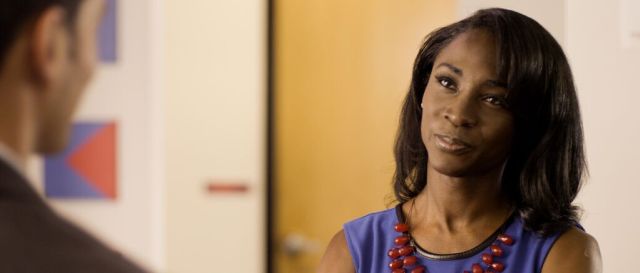
Mey: Angelica, from your point of view, what was it was like playing this character who is a trans woman who is in a relationship with a man and doesn’t disclose right away and is looking for a happy relationship?
Angelica: It portrays a situation that I think even me personally, I have been anxious about. About really not wanting these contrived situation of me meeting guys. I would prefer to meet a guy that is in the realm of all the things I’m doing. Whether I’m in a bookstore, or having meetings here and I see this guy. It’s nerve-racking because on the internet you can put ahead of time I’m trans and filter people from there. In real life on the streets there are no filters. You don’t know who knows or who doesn’t know. It shows sort of the steps we have to go through internally, okay, do I say something now? Or do I wait because he could totally come off to me as a complete asshole or maybe I just don’t like him.
It was also great being able to play this role and being able to give a nod to all trans women of color that we are losing. When Jen asked me, hey, we want you to rename the character, give us a name. I thought of Paige Clay (a trans woman murdered in Chicago in 2012) immediately. I feel this serendipity thing going on where we name the character Paige. I feel this thing of “having a page in her story” and it felt right.
Mey: Can you both talk about what you hope trans people who watch this show will get from it?
Jen: There is real power in seeing yourself represented. It’s something that a lot of people can take for granted — they grew up and can always identify with the heroes of stories. When you grow up in media and you are only ever a tragedy or a joke, it’s hard not to see your own life as a tragic joke. I think for us to show this other model of possibility, to show what it’s like for trans women to have friendships and to be in relationships, to laugh, to have joy, very human dramas, that include but can’t be reduced to their trans-ness.
Angelica: We’re just now getting to a place where we are creating media, we’re trying to have a relationship with media. Even with Janet at the helm people are still very cautious. They’re all waiting for the bad portraits and what have you. It is very interesting those that wanted to attack it at first, when they first start to get the gist, if you look at the information directed by trans woman, written by a trans woman, the trans women and characters are played by trans actors. We can’t have anything perfect. This is probably the closest you can get to a pure cultural product.
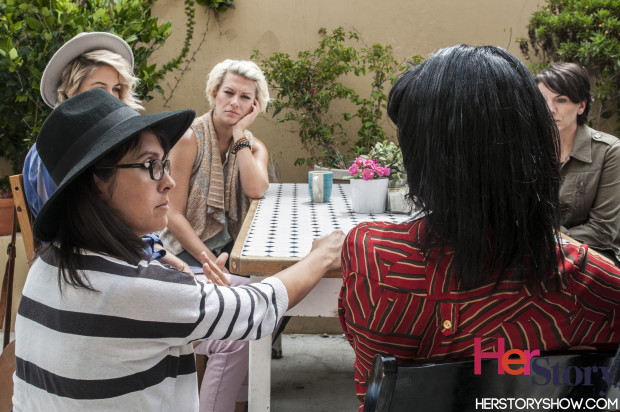
Mey: On that subject, can you tell me about how you got connected with director Sydney Freeland?
Jen: This is the funny story. We had wanted a trans director from the start; it was important for us to have. This was all a continuation of the Trans 100, the idea of having everyone involved be trans, from top to bottom, stage hands to the people running it. We wanted to do it as much as possible, also wanted maintain the highest possible quality. We wanted a trans director but that is a very very small, shallow pool of people. When we brought it down to trans people who were in LA and who could do the quality work we wanted and were available when we needed them it went down to zero. There was no one. Lana Wachowski is a little out of our budget. Zackary Drucker and Rhys Ernst were doing Transparent. We gave up on that and decided to expand our search to queer women and women of color. We expanded our pool. One of the very first names to pop up was Sydney Freeland who we just thought was a queer woman of color. Sydney’s movie (Drunktown’s Finest) had just came out and she had a trans actress playing a trans character. Sydney had written and directed the part. We saw it and we thought, this is an amazing movie and she has already worked with trans actress that wasn’t particularly experienced on screen this is perfect. We met with her and adored her. This is the right person. During a meeting, Sydney and eight others, I was in D.C. on a consulting project and they were at a table in LA. I made reference to Janet Mock and then explained the reference to Sydney and she said, “Oh I know who that is,” I thought okay, cool, a lot of people know Janet. A minute later the conversation moves on and Sydney is kind of looking funny, “wait a second, Jen, do you know my background?” Uhhh, I guess not, what do you mean? Uh, I’m trans. The whole table erupted. WHAT!? Not a single one of us knew. No one. Not one of us. It turns out she thought that was why we reached out to her because she was a trans woman, but it turns out we didn’t.
Angelica: That’s the goal! When you are sought out because of your skill and talent and not specifically because you are trans.
Jen: That’s the amazing part, you couldn’t have scripted. We ended up hiring a trans woman of color to lead and direct this project without knowing she was a trans woman of color!
Angelica: That’s pretty amazing.
Jen: Yeah, that’s the kind of magic was all around the set.
Angelica: That’s the kind of magic that has been all around this whole project.
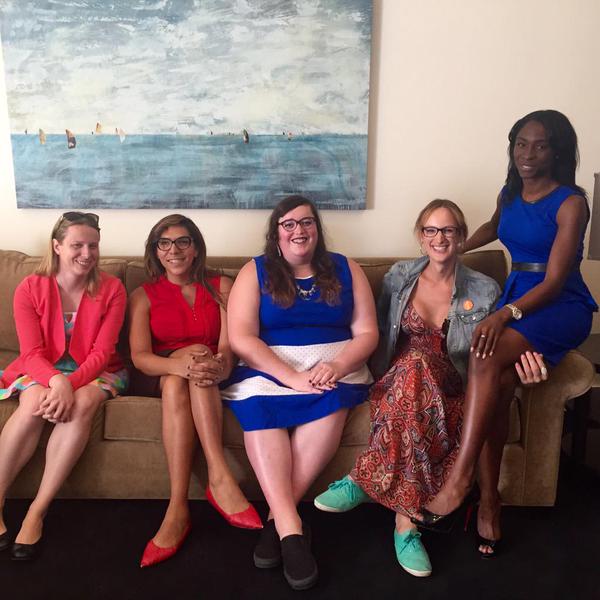
Mey: Speaking of that kind of magic, what has it been like working with so many talented trans women on the cast and the crew?
Angelica: Although Jen and I have known each other for a while, have been friends, I’ve never acted with Jen. It was just, moments where the writing was so good. It was just so good, that I’m doing the line and I’ve studied and prepared for the role. Then there are these moments where the lines she wrote really hit me. There was one moment I was caught off-guard ready to cry. Looking across the set or the table as I’m acting across from Jen. These moment when I’m looking at her and yes we’re acting but also having this other conversation. Can you believe that this is happening right now? We just did this. It feels right. I never imagined but I’m so blessed to have this experience. Before as an actor I never felt comfortable, I mean I felt comfortable, but I always felt that I could be found out by the lens of the camera as it gets too close. Or could be found out by an actor if he got too close.
Jen: Likewise, Angelica is one of those people that I sometimes joke that it’s like discovering a goldmine in your backyard. How the fuck did no one know this fucking goldmine sitting right here in my background. You’re like, looking around, does no one else really see this yet?
From the moment I met Angelica, this woman is a star. It was inconceivable to me that she wasn’t already a star. Then you and I were living together and her having such a distinct voice and that voice really being in my head and writing a part for her was easy. I still had reservations about us acting in lead roles. When we first wrote it we thought it was going to be this little small thing in Chicago that like ten people would see. As it got more professional and it got bigger budget and it came out here and we started hiring professional actors then watching all these audition tapes and seeing these reels and these guys with IMDB credits. Then being, oh my fuck what the hell are we going to do? Then I was nervous and Angelica got a little defensive she said, “Girl, I’ve acted before.”
Angelica: Yeah, I did!
Jen: She got a little offended that I was like nervous. I didn’t know until I saw her on screen. She had six days in a row, 12 hour days, had come from a stream of consulting gigs in DC, flew out and was on set in perfect hair everyday on time and came into every single take with a perspective and interpretation. Every time Sydney said, “Let’s try this.” She went right there. Jesus, she is so fucking talented. Watching the footage she is just a breakout star. Girl, get ready to live in LA. There is no way when this comes out, there is no way she is not going to have Hollywood come knocking.
We sometimes joke we forget Sydney as trans. It just doesn’t come up around her. She is one of these girls who it is just not an overt part of her identity. Again, she is not stealth, she doesn’t hide it. It just doesn’t come up. But she is, and it is true there are moments when you do feel more comfortable. I feel more comfortable just because it is a woman director.
Angelica: Absolutely.
Jen: And a woman of color. There are other moments when she’ll say something and oh my god, that’s right you get it. You’ve been in this situation before. It suddenly all becomes real. Also, our sound person, Ada, is a trans woman who came out during filming.
Mey: Oh wow!
Angelica: And she was having a hard time with it and you know. Jen and I seem to be tagging teaming here and there, “Girl, we see you!”
Jen: That was fun, there was one day where it was kind of one of those days it was easy to take for granted until one day she couldn’t be on set and she had a substitute. There was a cis guy on set. All of a sudden it just felt different. Taking away one trans woman and adding in a cis guy it just shifted the balance of the set.
Mari, our assistant editor, is a trans woman and having her around has been great. Again, I know her voice is in the room. Our experience resonate and she is sensitive to them. She gets these issues.
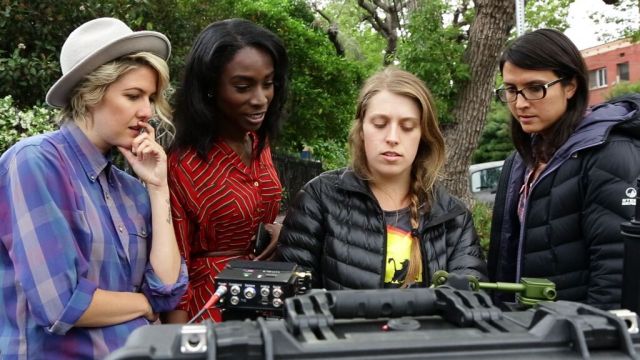
Angelica: I’ll say too as a trans woman of color I’m in a place of I feel sort of in awe and kind of this was my dream. I wanted to go to Juilliard, I wanted to be a song writer, to do musical theater to do acting, modeling I wanted to do all of that. My family was like, you’ll never make that. You are black. We don’t have the privilege of doing these things. The only way you will survive is doing business. Then coming out what I thought was gay at first and then coming out as trans, my family was like you’ve got three strikes against you. You know? I felt this nudge because after getting kicked out of the house, after being fired from several jobs or what have you, I started to get this notion that I don’t have time for this music. I don’t have time for these things. This is not paying my bills. I really am a survivor. My path lead to become a businesswoman and then do these things out of survival.
I’ve been an advocate out of me being to advocate for myself. If I did not have to be pushed into that direction from the first grade, I’ve lived, breathed music in theater in performance. Now, I’m in a place where there is all new possibilities from this show, this show I feel it. I used to go on castings and have to look at whatever my age was and call these different places. Now, I don’t ever call anyone. They literally call me for every reality show, for all these things. If I was 18 or 19 when I was auditioning I would sleep on the concrete for Who Wants to be an MTV VJ. Now, it has to work with me. I feel valuable. It is nice to feel valuable as a trans person. As a black trans woman and as something as frivolous as a black trans performer.
Jen: I want to acknowledge too that I think Angelica are particularly blessed and we are part of a larger circle of trans women. All of whom openly love and support each other. We’re personally close friends with Janet Mock and Laverne Cox and Tiq Milan and Geena Rocero, Laura Jane Grace, and the Wachowskis.
Angelica: Pretty much everyone who has really been doing work and has become very visible for that work. I think we all gravitate towards each other because when you get to a certain level and you start looking around and you are the only one in that particularly room you have to crawl across the country. I’m experiencing this and I’m experiencing that, no one before can tell us except each other. I think a lot of people don’t know the work that is involved in getting to a certain level of things. It is hard to have conversations with people and people in community that either haven’t had access to certain spaces and environments you may not know what the process looks like. A lot of time they look at Jen and I. A lot of us. Oh, we made it over night. Or look how easy it is. Or they are getting this because they are pretty. There is so much more. I am very grateful for my drag days. Doing performance because I can pull myself together very quickly. But I know if I’m not in hair and make-up I’m just a normal girl like the next girl.
Jen: That is such bullshit.
[All laughter]
Jen: Don’t believe that!
Angelica: I’m just like the next girl, it’s just a simple fact. When it comes down to doing the work. I’m willing to pull my hair back and just get on the ground and do the work. Roll up my sleeves and get it done.
Jen: The single factor that unites all these girls including Bailey Jay and a lot of other sex workers, and to performers, artists, writers, journalists is the hustle. These are the hardest working people I know. They know it is a hustle…
Jen: In a way Her Story is like, aspirational magic. We’re trying to invoke the world that we want through art and through making it real. This is real, this is possible. We are trying manifest that reality
Angelica: The things is, I think it is real, you just don’t see it that often. There are trans relationships out there. Both with cis folks and trans folk, or two trans people, two trans women, or a trans guy and a trans woman. It’s just that, I believe the more it comes out of the websites, infatuation, fantasies and all that and people can actually see us as human beings, that work, that love, that have friends, that go to the beach, that laugh, that joke, all the things that we do in our instagrams on our Facebook they can finally be like, you know what, it doesn’t have to be this tragic story. I can be with someone and still have friends.
Jen: We rightfully talk about the violence against trans woman of color the stigmatization of male desire for trans women. There is another price for this stigmatization of female desire for trans women which is less violent but it is loneliness, mental illness and self harm. This notion that if you are someone who is attracted to women and you transition, the sense that no woman is ever going to want me so you give up on love, that hurts you. That is one of the first things when I first transitioned, that was one of the things that I came to terms with, was “I’ll never date again.” I had to accept that to move forward. That leads to addiction and self-harm and all kinds of things. It gets lonely.
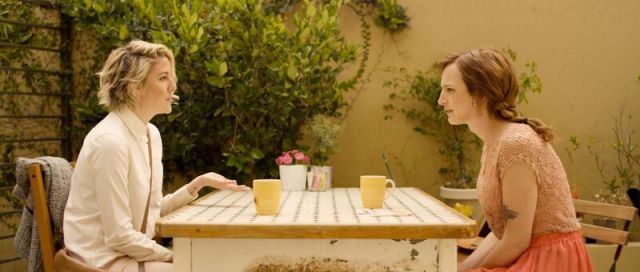
Angelica: I remember when I was 19 and I met this guy Savino, Italian, just gorgeous. I met him while I was waiting tables, he gave me his phone number and I went on a date with him. I was at a point, especially when I was younger, I would forget I was trans. Like it was this thing of that life would remind me at certain points but because I could keep going la, la, la and something would happen, oh fuck, you’re trans. When I met this guy and I had a couple of dates with him and my heart was like pitter-patter. I had this moment with myself when I disclosed, he told me, well, you’re a pretty girl but I just can’t go that route. I thought to myself, god, what kind of life is this where everywhere I walk down the street and I attract the men I’m attracted to, I don’t even have a choice.
I relate with Paige in I kind of brush off things that come outside of what I’m expecting. I don’t let it in because I’m not expecting it you’re not coming the way I want. I just thought I would never be in a relationship I’m going to constantly meet someone and constantly tell them and they’re going to constantly say they can’t deal with that. That is what made me go to online dating and always disclosing ahead of time. I realized with doing that, every time I disclosed right away it opened the door for a million disgusting questions or just being reduced to a fetish.
Mey: I guess, we already talked about what you hope what trans women will get when they watch this show, what do you hope other people will feel or experience or learn?
Jen: Bottom line, as a love story, I hope that people just feel. That they want the characters to find love. That they identify with the struggles. They cry when we cry and they laugh when we laugh. Ultimately that is the real goal. Anyone can watch this and enjoy it. Feel something from it. Beyond that, that they can see trans women as human. You know? As human people with rich inner lives and relationships. That are often stigmatized or just erased by popular culture are a part of our larger world. We are already in your world. We are not strangers. I hope that that comes as well. You identify with us then therefore end up becoming our friends, lovers or advocates.
All we can do is tell one story well.
Angelica: It is a beautiful beginning of a story. I feel like it’s the start we need.
I don’t know if I’ve ever fallen in love with a web series before, but just like the characters in Her Story, I’m willing to give this relationship a chance. I hope that this series will be a success. It would be great if it gets picked up and becomes a bigger show. It would be great if Jen and Angelica and Sydney and Laura get more jobs because of this. Her Story is exactly the kind of trans media that I want to see, and if it’s the start of something like Angelica said, it’s a damn good one. Once again, Her Story only has a few more days to reach its fundraising goal, so please donate if you can and spread the word.







